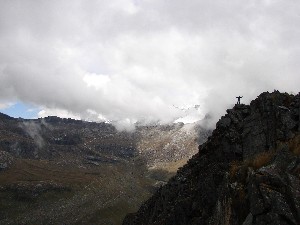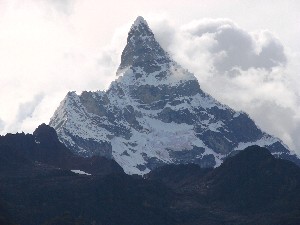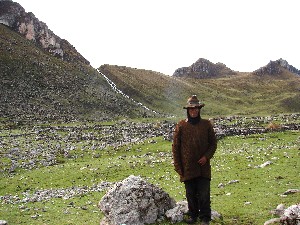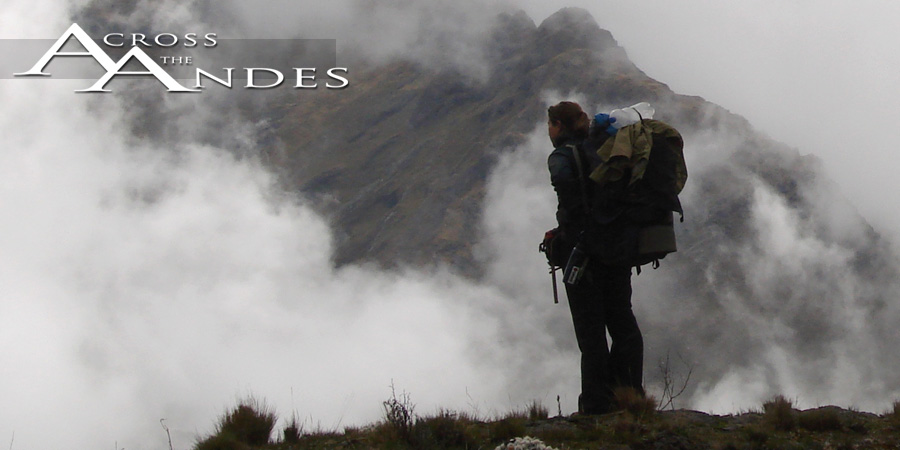Thoughts and Holidays
By Deia Schlosberg
December 23, 2006

I'm going to try something new here. I'm straying from the status quo update of trip play-by-play and superlative displacement. I figure after six months it's time for some more day-to-day bits and thought-sharing. The real deal, the nitty gritty, all that.
For this last section, we walked a good length of Incan road. The road is a feat of ancient, and modern even, engineering. The width varies from less than a meter when limited by rock cliffs to six meters wide in open, grassy pampa. Much of it is lined on both sides by inset rocks/small boulders with periodic inset rock drainages running perpendicularly across the trail to keep it from getting too mushy. These gutters were probably very effective in the time of the Incan heyday. Now they are only in tact in places, leaving the Incan road-walker caked from toe to knee (at least those daring (or ridiculous) enough to hike in the wet season) in mud. Mud aside, there was something very special about walking on a portion (we will return for more) of a track running thousands of kilometers toward Cusco, the center of the empire. We have been on other parts of the Incan trail network webbing across much of South America, but this time it felt different. Somehow being on a major ancient highway and knowing how many Incan runners covered the same exact steps centuries before, in the same direction, with the same destination made me feel like I had more of a purpose, like I was part of something bigger than me and this trek of ours. I felt like we were experiencing Peru in the way most in accordance with its history and traditions.
Purpose is something I think about a lot in doing what we're doing. But one of the big reasons that I always come back to for keepin' on is learning as much as possible and being able to pass it along in the future. But until a certain conversation with Jessie, an intelligent friend from "the outside," I didn't realise that I had learned much more than I was aware of---about culture, society, language, ways of thinking, etc. I know the reason I wasn't aware of these acquisitions is the same reason that three-year-olds are not conscious of the fact that they are constantly learning; it is a learning through absorption and doing rather than a deliberate "learning time" that we come to accept through school being set up the way it is in most countries. I know I have allocated more information in my brain from this trip than I did from a couple of semesters of college; and I got a lot out of college. What am I saying? I am very appreciative of my educational opportunity here, and I definitely support experiential learning in schools. ...Pending funding, I realise.

Along the Incan road (El Camino Real Incaico) were very impressive and very expansive stretches of ruins--stone walls and houses, which we passed every day. Some of these ruins were inhabited by campo families. They had built thatch roofs over some of the stone foundations and had animals grazing in the stone corrals. The striking thing about this picture was that these people were living, to our knowledge, almost identically to the people who lived on the same sites hundreds of years earlier. The two thoughts as to why are 1) they don't have the resources to "modernize," and 2) they live this way because it makes sense. The structures are built in relation to the abundance of materials in the area: mostly stone, a few wood beams, and thatch roofs. There is no reason to haul in expensive outside-manufactured materials when they have resources that work for their needs all around them. The animals live well in the pampa environment and provide much food and clothing for the people. The communities are seemingly entirely self-sufficient, and everything about the way these people live makes sense. That said, I don't think I'd be wrong to say that given the opportunity, they would chose to live with TVs and central heating and ice cream. I can't fault them; those things are appealing. But it does make me sad to see life going along so sustainably and simply and beautifully (and perhaps above all, every person we have talked to way out in these small communities seems genuinely happy) and know that it's probably a matter of time before plastic-wrapped packs of crackers make their way in, followed by the rest, and this way of life will be over. We've seen the stages of "progress" in progress, and it raises a lot of questions. But mostly it makes me sad.

Many of the campo people speak a mix of Quechua (the ancestral Incan language) and Spanish, so our mountain conversations are generally a lot more challenging than our city conversations, which are now flowing quite easily (especially the ones at the bars). If you want to get a feel for Quechua, go to www.google.com.pe and click on the Quechua link. It's a beautiful language to hear spoken and flows much more than it would appear to. We still know how to say nothing, except "pachi," which means "thank you." However, we do encounter many people who speak perfect Spanish, or Castellano, as it's called here, and though I try to make each conversation unique, there is a general pattern that cannot be avoided. Here is a rough outline of the exchange that happens probably an average of four times a day (translated, of course):
Us: Good morning/afternoon/night!
Representative Peruvian: Good morning/afternoon/night! Where are you going?
Us: La Union, it's right down this valley, right?
R P: Yes, yes! It's far though! Oooh, far!
Us: How many hours, do you think?
R P: Oh four, five! But where are you going to stay?
Us: We have a tent, so we can stay anywhere pretty much.
R P: Of course, of course. A tent. Where are you coming from?
Us: Chacas.
R P: Chacas! That's far! Ooooh, far! How long did that take you?
Us: A few days.
R P: Don't you get tired?!
Us: Sometimes, but we're used to it. And it's so beautiful, it's ok.
R P: Ooooh! Very good! Have a good trip!
Us: Thanks. You, too!
R P: Thanks!
And of course, after all the fuss about how far we're going, the said Peruvian has just walked probably several hours and probably has several hours more to go, and of course does this walk in half the time that it takes us because this Peruvian probably does this trip once every day or few as part of his or her routine. The hills are covered by walkers. Nobody in the villages owns cars, so the method of to-ing and fro-ing is either mule or horse, or more likely, walking. Small foot trails are everywhere, and people are on them. The towns are built around the trails, and I find it very comforting to see design according to human beings instead of cars. Peru is a country of people, not one of automobiles (though the cabs in the cities might make it seem otherwise at first). As an extension to this, the cost of food, to fuel human bodies, is actually the cost of the food, and not the cost of fuel required to ship the food thousands of miles. The food is often carried from the nearby farms by animal. It's so simple and lovely. Though I know I will return to the States, my home, I have some fears about going back to a place where bodies moving and functioning and excreting and eating have so many hurdles in their way. (Though there is something to be said about the excreting part being more hidden and sterile. I do have parasites living in me for going on six months now ...)
About once every third day or so, after the aforementioned conversation, we get told that it must take a ton of money to be able to do what we're doing, but that of course we have it because we're American. And then we must add a second phase to the conversation, first of the frugality of our methods and the freeness of camping (land isn't privatised here, another score for human beings and being able to eat and walk), but then we have to explain that there is indeed poverty in the U.S. and that many people have a hard time supporting their families with two and three jobs, even. And that a meal at a restaurant that costs one dollar here, costs ten in the States. We say that even though we make more, the cost of living is more and there are many people who have to live on the streets because so many people don't have jobs. We tell them that the movies and TV don't show that part of America. Our new Peruvian friend is usually in disbelief for a while but ends up giving a big "Huh." in the end. Poverty is not a lack of money, it is a lack of food and health and shelter, which families here more generally have and and are free to have because their connection to the land is in tact and not for sale. They also, generally, place huge value on family, and have a very stable network for mutual support through relatives, who tend to remain close their whole lives. I'm not bashing the States, there are many wonderful things we are privileged with living there, I'm just trying to question the general image of what is thought to be a better way of life, which people on both sides of the coin seem to share.
To close, this is what we've been experiencing most days lately: Incan ruins, quinoa, rain clouds and lots of mud, great hats, barking dogs, campo women throwing rocks at their flocks of sheep, powdered soup packets, the longest days of the year here (7 PM sunsets), and lots of missing of family for the holidays.
And just a reminder, we have our Roadjunky forum, so if you feel like discussing anything, go for it there.
Happy Channukah, Merry Christmas and Happy New Year!







